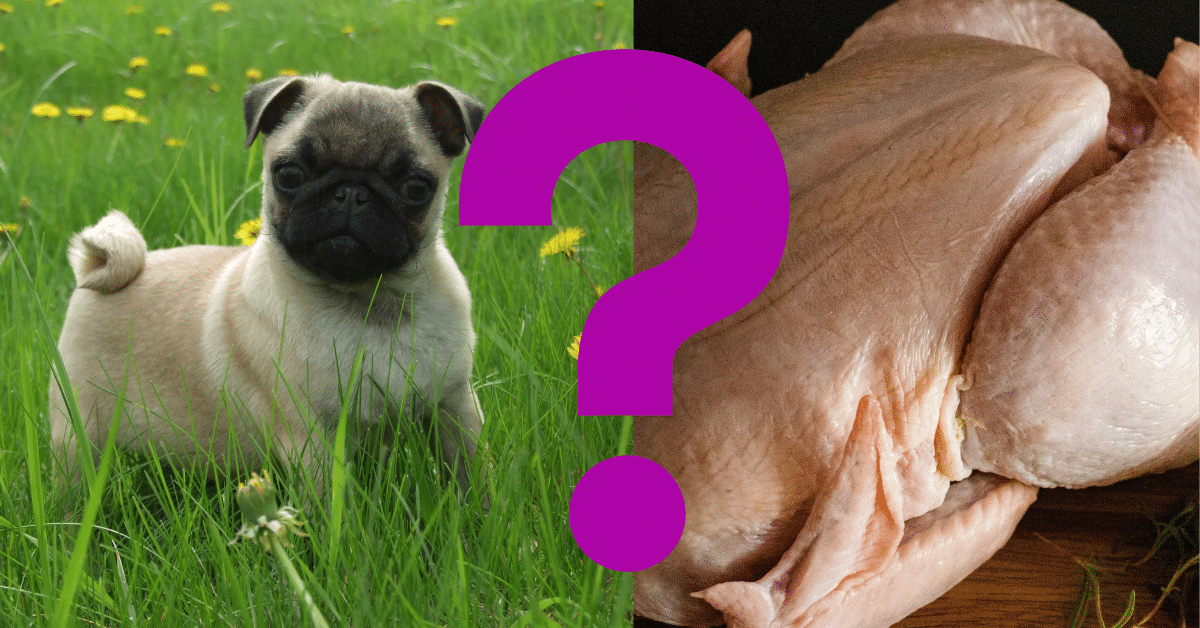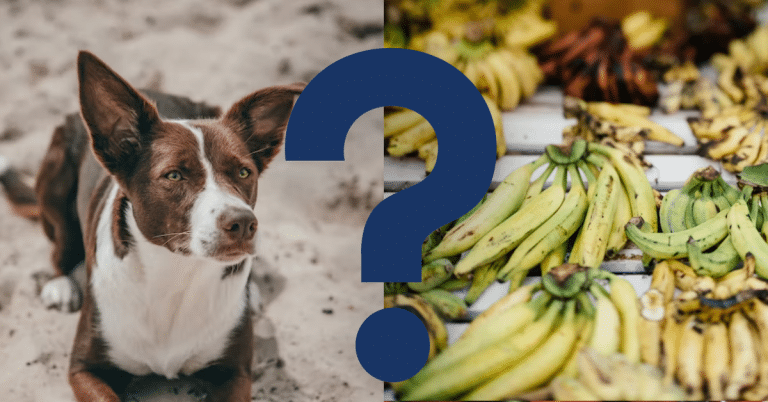Can Dogs Eat Chicken? A Vet’s Opinion

The most prevalent type of poultry in the world is chicken. Chicken is an essential source of meat and eggs for human use worldwide. But can you feed chicken to your dog?
Yes, dogs can eat chicken because it is high in protein. However, ensuring the chicken is cooked correctly, and bones-free is critical, as cooked bones can splinter and hurt dogs. Furthermore, dogs should be offered chicken without condiments or spices, as these might damage their digestive tract. Always consult your veterinarian to decide the appropriate amount and type of chicken for your dog’s diet.
Benefits Of Chicken For Dogs
Chicken is an excellent supplement to a dog’s diet for various reasons:
Protein
Chicken is a good source of high-quality protein for muscle mass maintenance, tissue repair, and overall dog growth and development. Protein is a nutrient that dogs require for energy as well as to maintain many biological functions in their bodies.
Amino Acids
Chicken contains essential amino acids required for a dog’s general wellness. Amino acids are the building blocks of proteins and are essential for dogs’ healthy skin, coats, and immune systems.
Nutrient-Rich
Chicken is a fantastic source of vitamins and minerals such as B vitamins, iron, zinc, and phosphorus, which are vital for a dog’s health. These nutrients are essential for dogs’ healthy bones, teeth, neurological system, and immunological function.
Digestibility
Cooked chicken is highly digestible for dogs, allowing their systems to break it down and readily absorb nutrients. As a result, chicken is an attractive choice for dogs with sensitive stomachs or digestive disorders.
Palatability
Because many dogs enjoy the chicken flavor, it can be an excellent alternative for luring fussy eaters or providing diversity to their diet. It can help them maintain a healthy appetite and encourage them to eat.
Weight Management
Chicken can be a lean source of protein for dogs depending on the cut of meat and how it is prepared. Lean protein can make dogs feel full and content, aiding with good weight management and preventing dog obesity.
Allergen Friendly
Chicken is not a typical allergen for dogs. Therefore it is a good protein option for dogs with dietary sensitivities or allergies. However, as with any new food, it’s critical to watch your dog for any signs of an allergic response and to check with your veterinarian if you have any concerns.
While chicken has many benefits for dogs, it should be eaten in suitable amounts and prepared without extra flavors, spices, or bones. It’s always a good idea to talk with your veterinarian about the optimal portion amount and type of chicken to include in your dog’s diet based on their needs and health state.

How To Safely Give The Chicken To Dogs
Here are some thorough instructions for properly feeding chickens to dogs:
Choose the Right Chicken: For your dog, choose fresh, boneless, skinless chicken. Cooked bones can splinter and represent a choking hazard or cause digestive tract harm, so avoid using chicken with bones. Avoid seasoned, flavored, or processed chicken containing additives, as they can harm dogs.
Cook the chicken thoroughly: Cook the chicken fully to kill any potentially harmful bacteria, parasites, or pathogens. In dogs, undercooked chicken can induce stomach discomfort or food poisoning. To ensure your dog’s safety, cook the chicken until it reaches an internal temperature of at least 165°F (73.9°C).
Trim Any Excess Skin and Visible Fat: Remove any excess skin and visible fat from cooked chicken, as these can be high in calories and difficult for dogs to digest. Overfeeding fat dogs can result in pancreatitis, a dangerous illness affecting the pancreas.
Chop or shred the chicken: Once thoroughly cooked and cooled, slice or shred it into small, bite-sized pieces that your dog can chew and swallow. Significant bits of chicken may represent a choking hazard to your dog.
Gradually introduce chicken to your dog: If you feed your dog for the first time, start with a small quantity and gradually increase the portion size over a few days to adjust your dog’s digestive system. It can aid in the prevention of stomach discomfort or food allergies.
Serve Plain: When giving chicken to your dog, avoid adding any condiments, spices, or sauces since these might be damaging to their digestive system. For dogs, plain, cooked chicken is the safest option.
Monitor for adverse reactions: Watch out for any signs of unpleasant reactions, such as vomiting, diarrhea, or behavioral abnormalities, in your dog after feeding them chicken. If you experience any troubling signs, stop eating chicken and visit your veterinarian.
Portion Control: Remember that chicken is part of your dog’s diet and should not exceed their daily caloric needs. Excessive consumption of chicken or other food might result in weight gain and other health issues. Based on your dog’s age, size, exercise level, and overall health, your veterinarian can advise you on the right portion size.
Store Cooked Chicken Properly: Refrigerate leftover cooked chicken in an airtight container for 3-4 days, or freeze it for longer-term storage. Cooked chicken should not be left at room temperature for extended periods because it can deteriorate and harbor hazardous bacteria.
Contact your veterinarian before modifying your dog’s diet, including adding chicken. Your veterinarian can make personalized recommendations based on your dog’s nutritional demands and health status.
Will Chicken Make A Dog Sick?
Here are some examples of how chicken can make a dog sick:
Bacterial Contamination: Raw or undercooked chicken may contain hazardous germs like salmonella or campylobacter, which can cause dog food poisoning. In dogs, these bacteria can cause digestive upset, diarrhea, vomiting, and other gastrointestinal disorders.
Bones: Cooked chicken bones, tiny and brittle bones like those found in chicken, might shatter and constitute a choking threat or cause digestive tract injury in dogs. They can produce obstructions, perforations, or tears in the gastrointestinal tract, which can be fatal.
Seasonings and additives: Spices, salt, garlic, onions, and other flavorings in chicken can be toxic to dogs. These components should be avoided because they can induce stomach upset, inflammation, or dog poisoning.
Allergies or sensitivities: Some dogs may be allergic or sensitive to chicken or other common elements found in chicken, such as grains or chemicals. It can result in allergic responses, skin problems, gastrointestinal disturbance, and other adverse effects.
Overfeeding: Feeding dogs too much chicken or any other meal can result in overnutrition, obesity, and other health problems. Chicken should be fed to dogs properly as part of a balanced diet.
Can dogs eat chicken variations?
While simple, cooked chicken is generally safe for dogs to consume, it is crucial to exercise caution regarding chicken variations or recipes that may have additional ingredients, flavors, or preparations. Due to potential dangers linked with particular ingredients or cooking methods, some chicken varieties may not be safe or acceptable for dogs. Here are a couple of such examples:
Fried or breaded chicken: Chicken, such as chicken nuggets or fried chicken, is frequently heavy in fat, sodium, and possibly hazardous additives such as breading or batter. These can be difficult for dogs to digest, resulting in digestive discomfort, pancreatitis, and other health problems.
Seasoned or spicy chicken: Chicken that has been seasoned, salted, or marinated with components such as garlic, onions, salt, or other spices might be toxic to dogs. These components should be avoided because they can induce gastric upset, discomfort, or dog poisoning.
Chicken with Sauces or Gravy: Chicken dishes with sauces, gravies, or other condiments may have extra sugars, salts, or artificial chemicals that harm dogs. These can cause obesity, dental difficulties, and other health issues in dogs.
Raw or undercooked chicken: Chicken tartare or chicken sashimi can contain hazardous bacteria such as salmonella or campylobacter, which can cause food poisoning in dogs. To prevent potential bacterial dangers, properly cook chicken before feeding it to dogs.
Processed chicken items: Chicken hot dogs, sausages, or deli meats, may contain additional additives, preservatives, or fillers that are not good for dogs. These goods may contain excessive sodium, fat, and additives and should be avoided or fed with caution.

Vet’s Summary
While simple, cooked chicken is safe for dogs to eat, it is vital to be aware of chicken variations or recipes with additional ingredients, flavors, or cooking methods detrimental to dogs. Fried or breaded chicken, seasoned or spiced chicken, chicken with sauces or gravy, uncooked or undercooked chicken, and processed chicken products may be detrimental to dogs owing to high fat or sodium content, harmful additives, bacterial contamination, or other health concerns.
Before giving your dog chicken or any other new food, please consult your veterinarian to ensure it is safe and appropriate for your dog’s nutritional needs. Additionally, probiotic pills may be beneficial to your dog’s digestive health. Probiotics are beneficial microorganisms that promote good digestion and overall well-being in dogs by helping to maintain healthy gut microbiota. However, it is critical to speak with your veterinarian to decide the best probiotic supplement, dosage, and duration for your dog, as each dog is unique. Probiotic supplements should be of excellent quality to ensure optimal safety and efficacy, specifically made for dogs and used following your veterinarian’s instructions.
Videos To Watch
If you are wondering if you can give your dog chicken, watch this:
And if you want to know what a dog can NOT eat, watch this:






